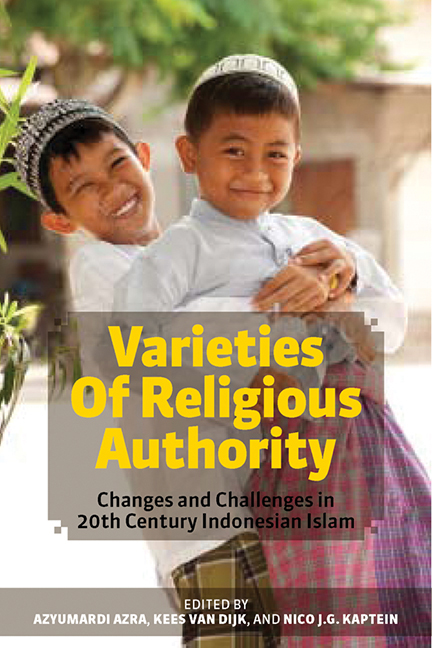Book contents
- Frontmatter
- Contents
- About the Contributors
- Acknowledgements
- Introduction
- 1 The Redefinition of Religious Authority among South Asian Muslims from 1919 to 1956
- 2 Understanding Al-Imam's Critique of Tariqa Sufism
- 3 Traditional Islam and Modernity: Some Notes on the Changing Role of the Ulama in Early Twentieth Indonesia
- 4 The Role and Identity of Religious Authorities in the Nation State: Egypt, Indonesia, and South Africa Compared
- 5 Authority Contested: Mathla'ul Anwar in the Last Years of the New Order
- 6 Struggle for Authority: Between Formal Religious Institution and Informal-local Leaders
- 7 The Indonesian Madrasah: Islamic Reform and Modernization of Indonesian Islam in the Twentieth Century
- 8 From Apolitical Quietism to Jihadist Activism: “Salafis”, Political Mobilization, and Drama of Jihad in Indonesia
- 9 From handling Water in a Glass to Coping with an Ocean: Shifts in Religious Authority in Indonesia
- 10 Religious Authority and the Supernatural
- Index
6 - Struggle for Authority: Between Formal Religious Institution and Informal-local Leaders
Published online by Cambridge University Press: 21 October 2015
- Frontmatter
- Contents
- About the Contributors
- Acknowledgements
- Introduction
- 1 The Redefinition of Religious Authority among South Asian Muslims from 1919 to 1956
- 2 Understanding Al-Imam's Critique of Tariqa Sufism
- 3 Traditional Islam and Modernity: Some Notes on the Changing Role of the Ulama in Early Twentieth Indonesia
- 4 The Role and Identity of Religious Authorities in the Nation State: Egypt, Indonesia, and South Africa Compared
- 5 Authority Contested: Mathla'ul Anwar in the Last Years of the New Order
- 6 Struggle for Authority: Between Formal Religious Institution and Informal-local Leaders
- 7 The Indonesian Madrasah: Islamic Reform and Modernization of Indonesian Islam in the Twentieth Century
- 8 From Apolitical Quietism to Jihadist Activism: “Salafis”, Political Mobilization, and Drama of Jihad in Indonesia
- 9 From handling Water in a Glass to Coping with an Ocean: Shifts in Religious Authority in Indonesia
- 10 Religious Authority and the Supernatural
- Index
Summary
INTRODUCTION
In the history of Indonesian Islam, especially in Java, ulama (kiai, ajengan, tuan guru, tengku, buya) played a hugely significant role in the life of the people because of their position in the “Islamic” community. For centuries they had a dominant position in the Islamic communities because they were the only source of Islamic expertise. It was only after the ideas of democracy spread, modern institutions of learning were introduced, modern organizations were established and the state formation got underway that their authority began to be challenged or — better — that they found competitors.
Theoretically speaking, when every individual is equal, knowledge (including religious knowledge) is accessible to everyone, and public affairs are handled by institutions, there will be no place for individuals to dominate authority. The reality, however, can always break the theory. Until the present time, local ulama still manage to maintain their religious authority in their “territory”, i.e., among groups of people who are loyal to them. A decision on a religious matter made by the highest decision bodies of, for example, Muhammadiyah and Nahdlatul Ulama, sometimes turns out to be inapplicable in a place where one or two ulama express a different opinion on the same issue.
AUTHORITY OF ULAMA IN RURAL SOCIETY
When Islam came to the Indonesian archipelago and became the religion of the majority of its inhabitants, some old traditions survived although they got new garbs. One example is in rural Islamic societies where ulama replace the position of exalted religious leaders functioning as a “medium” between the divine world and the profane; the divine world is believed to be inaccessible to common people but has much influence on what happens in the profane. For the lay believers, the ulama possess sacred knowledge and magical power due to their proximity to God. This position was partly a result of the ulama's pivotal role in spreading Islamic teachings. For many communities — especially in villages — ulama are the only source — of what the believer should know concerning religious obligations and rules.
- Type
- Chapter
- Information
- Varieties of Religious AuthorityChanges and Challenges in 20th Century Indonesian Islam, pp. 115 - 125Publisher: ISEAS–Yusof Ishak InstitutePrint publication year: 2010

